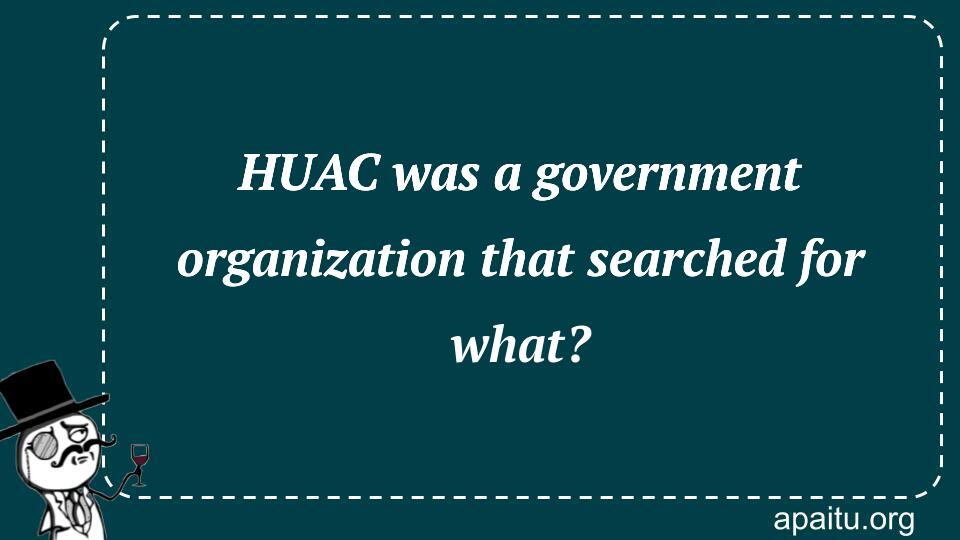Question
Here is the question : HUAC WAS A GOVERNMENT ORGANIZATION THAT SEARCHED FOR WHAT?
Option
Here is the option for the question :
- Nazi spies
- Suspected communists
- Convicted fraudsters
- Bootlegging gangsters
The Answer:
And, the answer for the the question is :
Explanation:
In 1938, the House Un-American Activities Committee was formed to investigate suspected communists.

The House Un-American Activities Committee (HUAC) was a government organization that became synonymous with the search for suspected communists during a significant period in American history. Established in 1938, HUAC operated under the jurisdiction of the United States House of Representatives and played a prominent role in investigating alleged subversive activities and political affiliations.
During the height of the Cold War, HUAC’s primary objective was to identify individuals believed to be associated with or sympathetic to communist ideologies. The committee conducted extensive investigations, hearings, and interrogations, aiming to expose communist infiltration in various sectors of American society, including government, entertainment, academia, and labor unions.
The fervor of anti-communist sentiment in the United States during the mid-20th century led to a climate of fear and suspicion. HUAC capitalized on this atmosphere, often employing aggressive tactics and controversial methods to root out individuals deemed as potential threats to national security. Witnesses were summoned to testify before the committee, where they were subjected to intense questioning about their political beliefs, affiliations, and associations.
Notable among HUAC’s endeavors was the Hollywood blacklist, which targeted individuals working in the film industry suspected of communist sympathies or involvement in left-wing organizations. The committee’s investigations resulted in the blacklisting of numerous actors, writers, directors, and producers, effectively ostracizing them from their professions and tarnishing their reputations. The Hollywood Ten, a group of filmmakers who refused to cooperate with HUAC, became symbols of resistance in the face of the committee’s controversial tactics.
HUAC’s activities were not without criticism and controversy. The committee faced accusations of violating civil liberties, suppressing free speech, and engaging in witch hunts. Many argued that HUAC’s methods were overly zealous and infringed upon the principles of democracy and individual rights. Nevertheless, the committee’s investigations garnered significant attention and had a profound impact on the lives and careers of those targeted.
In the early 1960s, as public opinion began to shift, HUAC’s influence waned. The committee’s aggressive tactics and perceived abuses of power came under scrutiny, leading to a decline in its authority. In 1975, the House of Representatives officially dissolved HUAC, marking the end of an era characterized by intense anti-communist fervor and the search for suspected communists.
The legacy of HUAC continues to be a subject of debate. While some argue that the committee played a crucial role in safeguarding national security during a time of perceived communist threats, others view it as a dark chapter in American history, highlighting the dangers of political witch hunts and the violation of civil liberties. The impact of HUAC’s investigations on the lives of individuals and the broader cultural landscape of the United States cannot be underestimated.
the House Un-American Activities Committee (HUAC) was a government organization that embarked on a mission to search for suspected communists. Operating during a period of heightened anti-communist sentiment, HUAC conducted investigations and hearings in its quest to identify individuals believed to be associated with communist ideologies. While its actions generated controversy and criticism, HUAC left an indelible mark on American history, shaping the lives of those targeted and sparking debates about the balance between national security and individual rights.